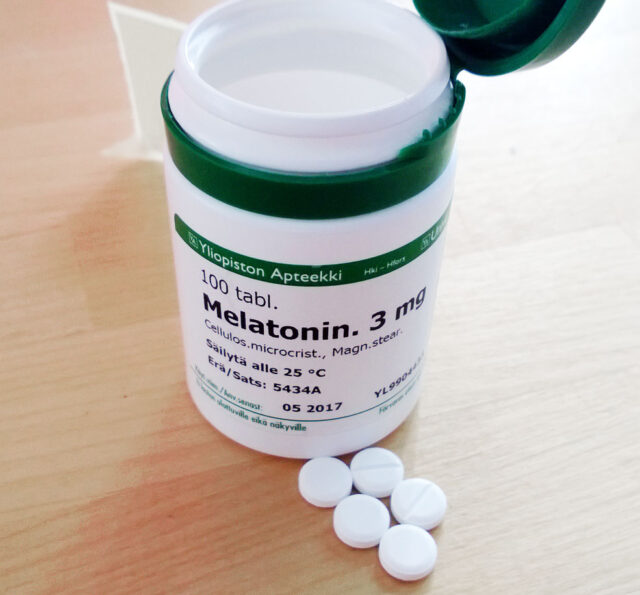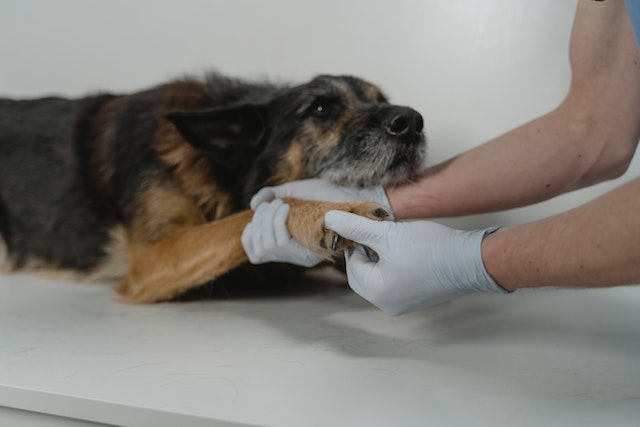Dogs, like humans, need quality sleep to stay healthy and happy. But for some pups, restlessness, anxiety, or even medical conditions can make it difficult to settle down at night. If your dog struggles to relax before bedtime or experiences stress in certain situations, melatonin may offer a natural and effective solution.
Melatonin is a hormone that helps regulate the sleep-wake cycle, and while it’s commonly used by humans, it can also benefit dogs. Beyond promoting better sleep, melatonin has been shown to help reduce anxiety, manage certain medical conditions, and even support hair growth in dogs with alopecia. Understanding how melatonin works, its potential benefits, and the right dosage can help you determine if it’s a good fit for your furry friend.
Let’s take a closer look at how melatonin can support your dog’s well-being and help them feel more calm and rested.

Related: Best Dog Breath Fresheners
What is Melatonin?
Melatonin is a hormone that exists naturally in both dogs and humans. It’s what regulates our circadian cycle. In other words, it makes us sleepy when our bodies try to regulate our sleep schedule. The pineal gland in our brains creates melatonin based on the light cycle, so production increases during darkness.
Bodies will produce more melatonin when it’s time to sleep, but in some cases, our brains won’t create as much as we need. That’s why humans take melatonin supplements to make up for it. The synthetic version of melatonin can help make sleep easier for humans.
Dogs have melatonin in their bodies just like humans do. So, if their brains don’t produce enough at bedtime, they’ll be left wide awake, too. That’s why many dog parents have chosen to give melatonin to their furry friends to help with sleep and other concerns.
Is Melatonin Safe for Dogs?
Yes, melatonin is a safe supplement for dogs. However, if you choose a melatonin brand that’s made for humans, look at the ingredient list closely. Some types of melatonin have fillers and coatings that aren’t safe for dogs.
When you buy melatonin for your pet, make sure it doesn’t contain artificial sweeteners like xylitol since those can be toxic to dogs. Look for an option that’s filler-free because FDA-approved ingredients for humans might not be okay for dogs. Better yet, find an option that’s formulated specifically for pets.
How much melatonin is safe for dogs varies based on your dog’s size, so follow your vet’s instructions closely to avoid complications. Giving your dog the correct amount reduces the risk of side effects.

Side Effects of Melatonin for Dogs
Melatonin has very few side effects, so it’s often used as a safer alternative to other medications. The only common side effect your dog could face is lethargy when they wake up. Uncommon side effects could include digestive problems, increased heart rates, itching, or confusion. It’s best to avoid this medication if your dog has liver or kidney problems.
Melatonin should never be given to pregnant dogs as it could cause changes in fertility. It could also pose risks for both the mother and unborn puppies. Vets recommend that you avoid giving melatonin to puppies under 12 weeks old. If your dog has any reactions after taking a dose of melatonin, stop giving it to them and contact your vet.
Humans could have irregular sleep patterns, itchiness, drowsiness, low body temperatures, and headaches after taking melatonin, but it’s unclear if these side effects could occur for dogs.
What is Melatonin Good For?
Taking melatonin is a great way to get a good night’s sleep, but it has many other benefits. In addition to helping with insomnia, it can also reduce anxiety, pain, and stress. It’s a great way to calm the body in a natural way. Like with any new medication or supplement, it’s best to consult a medical professional before using it.
Not many studies have been done about melatonin for dogs, but many dog parents have discussed how it has improved their dogs’ lives. Some research suggests that dogs taking melatonin require less initial anesthesia before a procedure.
Melatonin is often used for relaxing dogs and humans, but it can also benefit a wide range of animals. For cats, it can prevent behavioral problems and suppress heat cycles. Horses can get improved breeding rates from it. Even ferrets can feel better after taking melatonin since it can treat adrenal disease for them.

What Does Melatonin Do For Dogs?
Melatonin is a relaxing supplement for dogs most commonly used to help them sleep at night. Insomnia can disrupt a dog’s regular sleep pattern, making it drowsy from a lack of rest. Melatonin helps dogs sleep through the night more easily, allowing them to be more energetic and lively during the day. It also works for dogs struggling to sleep due to cognitive dysfunctions.
Yet, improving your dog’s sleep pattern isn’t the only benefit this supplement can have on canines. Here are some other ways melatonin can positively affect your dog. If your furry friend is struggling with any of these issues, ask your vet if melatonin can help.
Calms Anxious Dogs
Melatonin is commonly used for calming dogs with anxiety, which is why you might find it in Hemp products. The most common type of anxiety dogs face is separation anxiety, which causes dogs to become restless and destructive when their humans are away. You can’t be with your dog 24/7, so it’s important to find other solutions, which could include melatonin.
Several other types of anxiety are also common in pets. Some dogs have noise anxiety, which is triggered by loud sounds, such as thunderstorms and fireworks. Others might be anxious during certain situations, such as visiting the vet or meeting new people. Another common dog anxiety is travel anxiety, which includes riding in a car or staying in an unfamiliar place.
Melatonin can ease all these types of canine anxiety. Its calming effects can help them feel mellow in scary situations, which reduces the risk of behavioral problems. Less anxious dogs usually have a better sleep schedule, too.
Related: The Best Calming Supplements for Dogs
Eases Disease Symptoms
Melatonin for dogs has been used to ease symptoms of Cushing’s Disease. Cushing’s Disease is when dogs produce too much cortisol inside their bodies, leading to stress and problems with their immune system. Dogs with this condition may experience weakness, frequent urination, skin conditions, and low energy levels.
Some vets will suggest melatonin for Cushing’s Disease because it has fewer side effects than other treatments. Melatonin can block excess cortisol in your pup to help their body function normally.
Melatonin may also benefit dogs with epilepsy. It has helped reduce seizures in some dogs. It won’t treat epilepsy entirely, but it will make the symptoms much less severe.
Heals Alopecia
Alopecia causes dogs to have sudden hair loss, usually around their lower back and tail. Luckily, melatonin can help a dog’s coat grow back after suffering from certain types of alopecia. The most common is seasonal flank alopecia, which only occurs in winter.
Melatonin isn’t a guaranteed solution for this condition, but it’s a low-risk, natural option for dogs. It can help the hair grow back and prevent more from falling out. The causes of alopecia are often difficult to determine since allergies or other skin problems do not accompany it. If left untreated, this condition could lead to dry skin and irritation.

Like all medications, melatonin may not have the same effects on every dog. It might not do anything for some dogs. If that’s the case, talk to your vet about other remedies for your dog’s health concerns.
Melatonin Dosage for Dogs
To figure out how much melatonin for dogs is ideal, you should consult your veterinarian. Even though it’s available over the counter, vets can give you the best dosage based on your dog’s age, weight, and medical history. Most dogs will need between 1 and 3 mg per dose, but dogs over 100 pounds may need as much as 6 mg. A melatonin dosage for dogs should be given no more than three times per day.
How many mg of melatonin for dogs based on weight:
- Less than 10 pounds: 1 mg
- 10 to 25 pounds: 1.5 mg
- 26 to 100 pounds: 3 mg
- More than 100 pounds: 3 – 6 mg
After giving your dog a dose, the effects will last for about eight hours. Most people give their dogs a dose before bedtime or prior to a stressful situation, such as a vet appointment. Melatonin doesn’t have to be served with food, but it may be the easiest option if your dog is picky about taking medicine. Offering medication with food also reduces the risk of an upset stomach.
When you’re not using the melatonin, store it in a tight container at room temperature. If you’re worried about your dog experiencing side effects, you can start with a lower dose than usual and then work your way up to the recommended dosage.
Are There Any Drug Interactions?
Certain medications can be dangerous if used together. If you give your dog melatonin, avoid using drugs like benzodiazepines, succinylcholine, and warfarin. There’s also a chance that melatonin could decrease your pup’s cortisol and estradiol levels. It’s suggested that you should avoid using melatonin with other medications that could make dogs drowsy, such as Benadryl.
If your dog is taking any other medications or supplements, be sure to mention them to your vet before giving them melatonin. It’s better to be safe than sorry when having your furry friend consume something new.

What Should You Do in An Emergency?
Melatonin is safe for dogs, so it’s uncommon for dogs to overdose or experience severe side effects. Yet, to be safe, it’s good to monitor your dog the first time they take a new medication or supplement. Keep an eye out for unusual behaviors, such as an upset stomach or prolonged lethargy.
Contact your vet right away if you have any concerns about your dog’s symptoms after taking melatonin. Be specific when telling them about the dog’s melatonin dosage and the behaviors you’ve noticed. Then, your vet will alert you of the next steps based on that information.
Related: Best Eye Supplements for Dogs
How to Serve Melatonin to Dogs
There are several ways to serve melatonin. The most common way is to give your dog a pill hidden in peanut butter or a pill pocket. Some vets might prescribe a liquid or powder version, which is often better for dogs with sensitive stomachs. Chewable supplements are a less common option, but they are a good choice for picky eaters since the chews seem like a treat. In rare cases, vets may place a melatonin implant under the animal’s skin.
Regardless of the type of melatonin you choose, the effects will occur within one to two hours. Some brands might even take effect within 15 minutes. Try to give your dog the supplement at the same time each day. If you miss a dose, don’t administer another one until the next scheduled time to avoid overdosing. The best time to give your pet melatonin is within two hours of bedtime.
Melatonin isn’t the only ingredient that can help your furry friend relax and sleep well. Organic hemp powder, chamomile, L-tryptophan, and valerian root can all work with melatonin to keep your dog feeling as relaxed and peaceful as possible.
Related: The Best Anti-Anxiety Beds for Dogs
Chew on This!
Since chews are often the easiest way to get your dog to take medications and supplements, calming chews are a great option to consider for your anxious or restless dog. Make sure to select a chew from a reliable company that you can trust to use the highest quality ingredients.
The iHeartDogs 9-in-1 Calming Chews use melatonin plus many other calming ingredients to soothe your dog’s anxiety and help it sleep at night. Melatonin also benefits digestion, improves skin and heart health, and controls seizures. This supplement includes all of the soothing ingredients mentioned above to keep your pup feeling its best.
With these tasty and beneficial chews, you’ll no longer have to watch your dog struggle before they go to sleep. The powerful ingredients will give your pup a natural relief from stress and anxiety. The chews are soft and bacon-flavored to appeal to picky eaters. As an added benefit, iHeartDogs donates 14 healthy meals for shelter dogs for every purchase. So not only will you be helping to keep your pup healthy, but you’ll also be helping fill the bellies of shelter dogs in need.
A Natural Way to Support Your Dog’s Sleep and Anxiety
If your dog struggles with sleepless nights, anxiety, or stress, melatonin could be a safe and effective way to relieve them. Whether it’s helping with bedtime restlessness, separation anxiety, or noise phobias, this natural hormone may improve their quality of life.
Before introducing melatonin to your dog’s routine, always consult with your veterinarian to ensure the proper dosage and safety for your pup. With the right approach, you can help your furry companion feel more at ease, sleep better, and enjoy a calmer, happier life.
- Best Joint Supplement for Dogs
- Best CBD Gummies for Dogs
- Goat's Milk for Dogs
- Skin & Coat Supplements for Dogs
- Weight Gain Supplements for Dogs
- Muscle Building Supplements for Dogs
- Heart Supplements for Dogs
- Multivitamins for Dogs
- Pill Pockets for Dogs
- Digestive Enzymes for Dogs
- Turmeric for Dogs
- Liver Supplements for Dogs
- Tear Stain Supplement for Dogs
- Breath Fresheners for Dogs
- Kidney, Urinary, & Bladder Supplements for Dogs
- Stool Eating Deterrent for Dogs
- Eye Supplements for Dogs
- Melatonin for Dogs
- Apple Cider Vinegar for Dogs
- Green Lipped Mussels for Dogs
- L Theanine for Dogs
- Chondroitin Supplements for Dogs
- MSM for Dogs
- Valerian Root for Dogs
- Chamomile for Dogs
- Boswellia for Dogs
- L Tryptophan for Dogs
- Yucca for Dogs
- Licorice Root for Dogs
- Bromelain for Dogs
- Papain for Dogs
- Devil's Claw for Dogs
- Quercetin for Dogs
- Hemp gummy for dogs
- Best Hemp Dog Treats
- Best Hemp Oil for Dogs
- Best Calming Treats, Chews, & Supplements for Dogs
- Best Bone Broth for Dogs
- Best Fish Oil for Dogs
- Best Probiotics for Dogs
- Best Hip Dysplasia Supplements for Dogs
- Best Colostrum for Dogs
- Best Quercetin for Dogs
- Best Greens for Dogs Supplements
- Best Vitamin C Supplements for Dogs
- Best Probiotic for Dog with Allergies
- Best Taurine Supplements for Dogs
- Best Dog Food Toppers
- Best Anal Gland Supplement for Dogs
- Best Dog Probiotic Powder
- Best CoQ10 Supplement for Dogs
- Best Liquid Glucosamine for Dogs
- Best Wrinkle Creams, Balms, and Wipes for Dogs
- Best Puppy Calming Treats
- Best Colloidal Silver for Dogs
- Best Adaptogen Supplements for Dogs
- Best Cognitive Supplements for Dogs
- Best Bee Pollen for Dogs
- Best Vitamin A Supplements for Dogs
- Best Vitamin E Supplements for
- Best Liquid Glucosamine Supplements for Dogs
- Best SAM-e Supplements for Dogs
- Best Hyaluronic Acid Supplements for Dogs
- Best Apple Cider Vinegar Supplements for Dogs
- Best Diarrhea Medicine for Dogs
- Best Milk Thistle for Dogs
- Best Turkey Tail Mushroom Supplements for Dogs
- Best Astaxanthin Supplements for Dogs
- Best Lutein Supplements for Dogs
- Best Electrolyte Supplements for Dogs
- Best Coconut Oil for Dogs
- Best Prenatal Vitamins for Dogs
- Best Puppy Milk Replacements
- Best Iron Supplements for Dogs
- Best Dewormer Products for Dogs
- Best Mange Medications for Dogs
- Best Cough Relief Products for Dogs
- Best Sinus Relief Products for Dogs
- Best Collapsed Trachea Supplements for Dogs
- Best Fireworks Anxiety Relief Products for Dogs
- Best Thunderstorm Anxiety Relief Products for Dogs
- Best Travel Anxiety Relief Product for Dogs
- Best Supplements for a Dog with a Torn ACL
- Best Supplements for a Dog with Patellar Luxation
- Best Supplements for a Dog with Intervertebral Disc Disease
- Best Zinc Supplements for Dogs
- Best Biotin Supplements for Dogs
- Best Tart Cherry Supplements for Dogs
- Best Resveratrol Supplements for Dogs
- Best Ginkgo Biloba Supplements for Dogs
- Best Ashwagandha Supplements for Dogs
- Best Supplements for Dogs with Cushing's Disease
- Best Adrenal Supplements for Dogs
- Best NAD+ Supplements for Dogs
- Best NMN Supplements for Dogs
- Best Supplements for Dogs with Dementia
- Best Supplements for Dogs with CCD(Canine Cognitive Dysfunction)
- Best Fiber Supplements for Dogs
- Best Spirulina for Dogs
- Best Hairball Remedies for Dogs
- Best Eye Drops for Dogs with Allergies
- Best Magnesium Supplements for Dogs
- Best Brushes for Double-Coated Dogs
- Best Dandelion Root Supplements for Dogs
- Best Probiotic for Dogs with Yeast Infections
- Best Flaxseed Oil for Dogs
- Best Chamomile Supplements for Dogs
- Best Lavender Supplements. Treats & Sprays for Dogs
- Best Collagen Supplements for Dogs
- Best Kelp Supplements for Dogs
- Best Activated Charcoal for Dogs
- Best Slippery Elm Supplements for Dogs
- Best Supplements for Dogs with Seizures & Epilepsy
- Best Antioxidant Supplements for Dogs
- Best Ubiquinol Supplements for Dogs
- Best Hormone & Glandular Supplements for Dogs
- Best Thyroid Supplements for Dogs
- Best Iodine Supplements for Dogs
- Best Dog Shedding Supplements for Dogs
- Best Detox Supplements for Dogs
- Best Postbiotics for Dogs
- Best Aspirin Products for Dogs
- Best Dog Anti-Nausea Products
- Best Dog Mouthwashes
- Best Camelina Oils for Dogs
- Best Hemp Seed Oils for Dogs
- Best Natural Anti-Inflammatories for Dogs
- Best Cancer Supplements for Dogs
- Best Sardine & Anchovy Oils for Dogs
- Best Fatty Acid Supplements for Dogs
- Best Chia Seed Supplements & Treats for Dogs
- Best Olive Oils for Dogs
- Best Amino Acid Supplements for Dogs
- Best Moringa Supplements for Dogs
- Best Echinacea Supplements for Dogs
- Best Cranberry Supplements for Dogs
- Best D-Mannose Supplements for Dogs
- Best Nettle Leaf Supplements for Dogs
- Best Marshmallow Root Supplements for Dogs
- Best Astragalus Supplements for Dogs
- Best Pumpkin Seed Supplement for Dogs
- Best Supplements for a Dog Wetting The Bed
- Best Blueberry Supplement for Dogs
- Best Bromelain Supplements for Dogs
- Best Yucca Supplements for Dogs
- Best Ginger Supplements for Dogs
- Best Rosehip Supplements for Dogs
- Best Allergy Medicines for Dogs
- Best Reishi Mushroom Supplement for Dogs
- Best Maitake Mushroom Supplement for Dogs
- Best Chaga Mushroom Supplement for Dogs
- Best Shiitake Mushroom Supplement for Dogs
- Best Cordyceps Mushroom Supplement for Dogs
- Best Lion's Maine Supplement for Dogs
- Have question? - Ask in our Dog Health Forum

 Toledo, United States.
Toledo, United States.